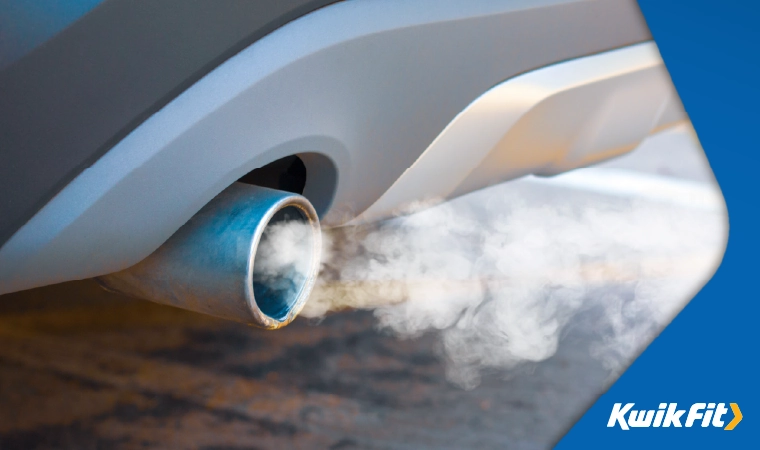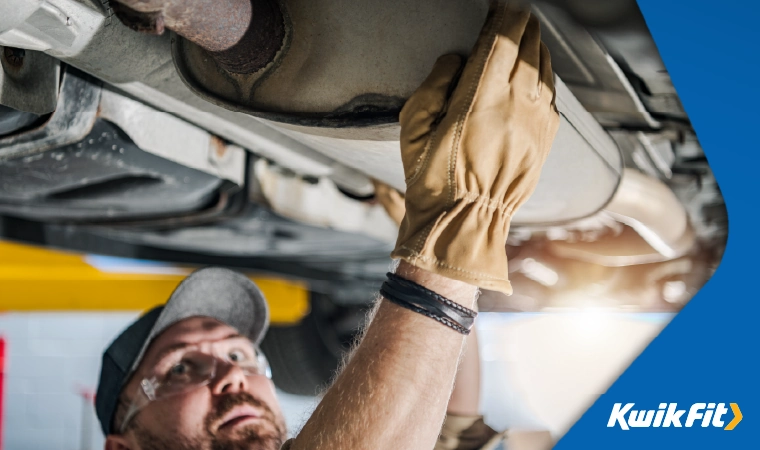Common Exhaust Issues and How To Spot Them
Jessica Bird | Tuesday 30th September 2025 10:00am

Heard a roaring or rattling sound when driving recently? Smelt a musty, smoky scent in your car? If so, it might be time to get your exhaust checked out.
From corrosion to clogged catalytic converters, your exhaust system is prone to all manner of faults - alongside the usual wear and tear that comes with regular use. Read on for the most common exhaust problems, and how to know for sure when something’s not right.
Why does exhaust health matter?
A healthy exhaust system is crucial for the safe operation of your car in terms of engine performance, noise reduction, and emission reduction.
Emissions
Your car’s exhaust system collects noxious gases like carbon monoxide and nitrogen oxide, generated by your engine, and removes the hazardous elements of these gases before safely distributing them out of the car and into the outside atmosphere.
If your car exhaust system fails, these dangerous fumes could enter the vehicle cabin, polluting the air that you and your passengers breathe, causing damage to your health. Failure of your exhaust system can also lead to the harmful elements of the fumes not being filtered out before being released into the atmosphere, exposing the surrounding air and those breathing it to these gases.
A healthy car exhaust system, alongside rerouting engine fumes, will also provide:
- Optimum fuel efficiency
- Improved engine performance
- Noise control and quieter running,
Legal implications
Unsurprisingly, current regulations state that the police can warrant the removal of any vehicle from the roads on the suspicion that it is producing excessive amounts of pollutant gases from the exhaust.

The most common exhaust problems
The most common problems with an exhaust system are usually leaks, smoke, rust, and issues with the catalytic converter or oxygen sensors.
1. Leaking exhaust pipes
Due to the constant exposure to heat, moisture, debris, and (in winter) road salt, exhaust pipe material can corrode away, leaving holes behind which cause leaks. A leaky exhaust pipe can not only cause loud noise and reduced engine performance, but higher emissions too (one of the most common reasons for MOT failure).
How to spot:
Look for cracks and black soot along your exhaust components, listen out for unusual sounds like hissing or very loud exhaust roaring, and see if you can smell fumes or gas.
2. Leaking exhaust manifolds
The exhaust manifold is responsible for transferring gases to the exhaust system from the engine cylinders. If a leak occurs here, these gases can escape, your fuel consumption can increase, and your engine can even get damaged if the leak goes undetected for too long.
How to spot:
Listen out for a ticking or hissing noise coming from the engine, check for an exhaust or fume smell in the cabin, and inspect the manifold itself for black soot marks, cracks, and damage.
3. Rusty or corroded exhaust
Rust and corrosion on exhaust systems is especially common in older vehicles that have been exposed to the elements for longer periods of time. If your car is used mostly for short trips, it’s also more likely that your exhaust system will experience corrosion because it doesn’t reach the temperature needed to burn off accumulated water on these shorter trips.
A rusty exhaust is a bit of a “gateway problem” to other, more serious issues like leaks and fumes entering the cabin.
How to spot:
You can spot rust and corrosion on your exhaust with a simple visual inspection. You’ll be able to see external rust immediately. However, it isn’t always as serious as it first appears, as it may only be on the surface. If the component has rusted through or is rusted from the inside (due to internal condensation build-up), though, that’s when it may be a cause for concern.
Use a screwdriver to gently prod rusty areas; if the structural integrity feels weak or a hole is formed, it is a sure sign that you’ll need an exhaust replacement, at least for this section.
4. Catalytic converter issues
Your car’s catalytic converter is essential for converting harmful gases into less toxic ones and reducing emissions. Over time, your catalytic converter (or “cat”) can get damaged or clogged with debris or unburned fuel or oil. If clogged, a cat can cause your engine to misfire, your engine to perform poorly, and your car to use more fuel.
How to spot:
A clogged catalytic converter is not as easy to manually spot as, say, a rusty exhaust pipe. Instead, it’s about monitoring your car’s behaviour. You may notice louder exhaust noises, reduced power, greater fuel consumption, or a rotten egg smell - all of which can indicate catalytic converter issues. Your check engine light may also turn on; in which case, you should take your car to your local mechanic as soon as possible.
The best way to know what’s wrong with your exhaust is to book in for a free catalytic converter and exhaust system check at Kwik Fit.
5. Faulty oxygen sensor
Your oxygen sensor is in charge of detecting how much oxygen is in the gases in your exhaust. The oxygen sensor then informs the engine control module of how it may need to adjust the fuel-to-air ratios for optimal engine performance.
How to spot:
You may be burning through more fuel than usual, your vehicle’s emissions may be higher, and you could be rough idling ( bouncing or shaking) if there’s an issue with your oxygen sensor.

How to spot exhaust problems
The simplest way to spot any issues with your exhaust is to conduct regular visual checks, listen out for unusual noises, and check for sudden increased fuel usage, odd smells, or shaking or rough idling.
Look: Conduct a visual inspection of your exhaust
Many car exhaust problems can be identified with a visual check. You can spot various types of damage, from cracks to rust and corrosion.
For holes and cracks, examine the entire length of the exhaust starting at the engine and continue down to the tailpipe, keeping a lookout for damage, especially the seams and joints where the different sections meet.
Listen: Unusual exhaust noises
Listen out for unusual sounds coming from your exhaust system - namely, roaring, hissing, chugging, loud metallic vibrations and rattling, with each of these noises being linked to a different issue.
Why is your exhaust roaring?
The silencer is the part of the exhaust that usually needs attention first due to its tendency to become corroded by acidic moisture. If you have a problem with your silencer, you’ll be able to hear it as your exhaust will begin to make a loud roaring noise.
Why is your exhaust hissing or chugging?
Hissing noises typically indicate a crack in the exhaust manifold, exhaust pipe or a leaking gasket, while the presence of a chugging noise coming from your exhaust could mean a blockage in the exhaust system.
Why is your exhaust rattling?
If you hear rattling under the car, it could mean that the exhaust system has become misaligned. A loud metallic vibration usually means that something is touching the exhaust pipe or that a clamp, support bracket or mounting, which holds your exhaust in place, is loose.
Corroded, fractured or missing brackets and hangers can cause extra stress on the system, which can also lead to premature exhaust failure, resulting in needing an exhaust replacement.
Keep an eye out for the check engine light
If there’s a serious issue with your exhaust system, your check engine light may turn on. Usually, this is because your oxygen sensor has failed. However, since the check engine light can be triggered by many different faults, it’s best to call the experts to help diagnose the issue.
Your exhaust might not be the problem
Should your exhaust begin to produce smoke, it may not be a sign of a problem with the exhaust but rather an issue with the engine.
What does exhaust smoke mean?
- Black exhaust smoke means that your engine is burning fuel too quickly. If this occurs, check your air filter, fuel injectors and the fuel pressure regulator.
- If you see white smoke coming from the exhaust, it may be nothing to worry about as it could simply be a build-up of condensation in the exhaust system.
However, if the exhaust continuously emits white smoke, this suggests your engine is burning coolant, and you may have a problem with your cylinder head or have a cracked head gasket. You’ll be able to spot if coolant is leaking into your engine oil as it will appear discoloured and creamy.
Free exhaust & catalytic converter check
Don’t risk failing your MOT, or worse still, putting your health at risk. If you have any concerns regarding the health of your car exhaust system, our trained technicians can provide a free exhaust and emissions check at over 600 centres across the UK.
We’ll check your exhaust and catalytic converter for a variety of damages such as cracks, leaking joints, broken hangers, worn rubber mountings, corrosion, failed gaskets and high levels of pollutant gasses.
Once our checks are completed, we’ll be happy to discuss and provide guidance on any areas that do not meet safety requirements. Book online for our free no obligation exhaust inspection service, or contact your local KwikFit centre.
Any facts, figures and prices shown in our blog articles are correct at time of publication.
Featured Articles
Is it Illegal to Drive With One Headlight?
Saturday 19th July 2025
Wondering if it’s illegal to drive with one headlight? Learn about the safety risks and penalties of illegal blown bulbs and why you should fix them promptly.
Air Con in EVs & Hybrids: Experts Answer Your Questions
Monday 30th June 2025
Does air con drain EV batteries? Can you use the air con while charging an electric car? Find out the answers to these questions & more from Kwik Fit’s experts.
Why Is Your Car Making a Noise? Fixes & Tips
Friday 13th June 2025
When your car starts making unexpected noises, it can certainly be quite disconcerting; it may be nothing to worry about, but here’s what you need to know.









